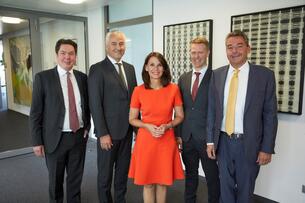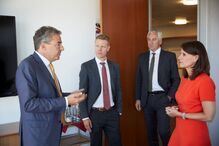Contact
Press Contact
If you have any questions regarding Koehler Paper, the Koehler public relation team will be happy to help.
Just submit inquiry using our contact form.
Politics meets economy
Parliamentary State Secretary Visits Koehler Paper Group
15.07.2019
Rita Schwarzelühr-Sutter, Parliamentary State Secretary for the Federal Ministry of Environment, visits Koehler in Oberkirch to discuss projects and visions. It is clear that SMEs and the paper industry can benefit from political support.

“Your opportunities are excellent across the board,” says Rita Schwarzelühr-Sutter, impressed by the presentation at Koehler Paper Group. The Parliamentary State Secretary for the Federal Ministry of Environment was in Oberkirch at the invitation of the company to get an idea of the family business’s activities.
Sustainability is Part of the Company Strategy
In a short presentation, Kai Furler, CEO of Koehler and representing the company's eighth generation, explained the company’s strategy, which has focused consistently on sustainability for several years. He not only focused on the paper side of the business, but also on innovation, renewable energy and the new business areas that Koehler is tapping into.
The area of paper for flexible packaging is of particularly great importance and is a driver for the company’s large-scale investment at the Kehl site. Koehler is embarking on the production of this type of paper and is developing barrier paper, which, thanks to the application of substances, can replace the function of plastics in packaging. “The advantage of this paper is that they can be recycled as waste paper,” says Furler.
Paper: The Classic Raw Material for Recycling
Furler and Schwarzelühr-Sutter agree that paper plays an important role in closing material cycles. Paper has always been a material that is superbly suited to recycling. There are effective and well-functioning paper recycling systems in this country. In Germany, around 75 percent of total paper consumption is recycled. Paper can be successfully recycled multiple times. Paper that is based on recycled waste paper fiber have an additional environmental benefit and is used to good purpose where 100 percent virgin fiber content is not required (i.e. applications not having direct contact with foodstuffs). Furthermore, paper production uses an unlimited source of renewable raw material that does not compete with the acreage used in food production.
Koehler also has many exciting approaches in the area of renewable energy. Not only was the company recently able to lay the foundations for another biomass combined heat and power plant, but the two fossil-fueled power plants at the Oberkirch and Greiz sites are also taking promising steps towards turning their backs on coal power, thereby supporting the achievement of national climate targets.
SMEs Are the Backbone of the German Economy
The energy sector is particularly dear to the Parliamentary State Secretary’s heart, as she herself entered politics through the anti-nuclear power movement. The 56-year old Social Democrat’s constituency is in Waldshut-Hochschwarzwald and she has been a member of the German Bundestag since 2005. She is also the first woman to head the Board of Trustees of the German Environmental Foundation (DBU).
During the visit, it became clear that politics has a strong and highly innovative partner in Koehler for their efforts, but it also became clear that SMEs need political support in return. After all, SMEs form the backbone of the German economy.









